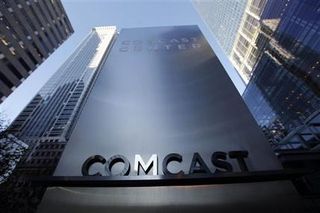Comcast/TWC: Bigger ISPs Are Not Better

From FCC chairman Tom Wheeler to President Obama to exiting Attorney General Eric Holder, the message has been sent throughout the land: If, as they have suggested, ISPs are the potential snake in the virtuous garden of broadband, a bigger snake is not better.
That appeared to be the takeaway from the free fall of the Comcast/TWC merger after both DOJ and the FCC signaled the deal should not go through. Comcast pulled the plug, but only when it was clear DOJ would sue to block it and the FCC could find no conditions that would suffice, not even apparently extending network neutrality conditions as a hedge against a third court loss.
That ISPs were gatekeepers in need of government intervention had already been the message in the FCC's Title II reclassification, urged by the President late last year in an unusual executive request to an independent agency. Wheeler has said that ISPs have the incentive and ability to suppress competition. He signaled that in arguing Title II was necessary to keep them in check. Ditto with preempting state municipal broadband laws he said were pushed by ISPs to prevent competition.
In taking credit for the deal's demise Attorney General Eric Holder made it clear the decision was about broadband and power. He said the deal had died "after the Department of Justice informed the companies that it had significant concerns that the merger would make Comcast an unavoidable gatekeeper for Internet-based services that rely on a broadband connection to reach consumers."
That broadband sub count had been estimated at more than half of all high-speed broadband subs by the deal’s critics, though Comcast had argued that number was inflated.
“The companies' decision to abandon this deal is the best outcome for American consumers,” said Holder last week. “This is a victory not only for the Department of Justice, but also for providers of content and streaming services who work to bring innovative products to consumers across America and around the world. I commend the Antitrust attorneys and investigators whose outstanding work led to this outcome, and I know that the Department of Justice will continue to fight for fair access and free competition in every industry and every market.”
Holder did give the FCC some credit for their "close and productive cooperation throughout this investigation."
Broadcasting & Cable Newsletter
The smarter way to stay on top of broadcasting and cable industry. Sign up below
For his part, FCC Chairman Tom Wheeler suggested that the country was better off with Comcast and Time Warner Cable not together and suggesting online video was the driving issue.
"Comcast and Time Warner Cable’s decision to end Comcast’s proposed acquisition of Time Warner Cable is in the best interests of consumers," he said. "Today, an online video market is emerging that offers new business models and greater consumer choice. The proposed merger would have posed an unacceptable risk to competition and innovation, including to the ability of online video providers to reach and serve consumers."
The FCC had a big hand in the deal’s demise as well after the FCC staffers vetting the deal recommended it be designated for hearing before an administrative law judge. That designation means commission staffers vetting the deal could not recommend approving it, even with conditions. An FCC source confirmed that recommendation.
Contributing editor John Eggerton has been an editor and/or writer on media regulation, legislation and policy for over four decades, including covering the FCC, FTC, Congress, the major media trade associations, and the federal courts. In addition to Multichannel News and Broadcasting + Cable, his work has appeared in Radio World, TV Technology, TV Fax, This Week in Consumer Electronics, Variety and the Encyclopedia Britannica.

